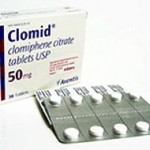The drug Clomid helps women with infertility problems
 Many women ask themselves what is Clomid now exactly? Clomid, or clomiphene citratetablets, are a drug administered as ovulatory stimulants, and are taken orally. Women suffering from ovulatory dysfunction, and who would like to get pregnant, are normally prescribed a course of Clomid. However, if such women suffer from any medical problems that would cancel out the effects of Clomid, they should first undergo clomiphene therapy.
Many women ask themselves what is Clomid now exactly? Clomid, or clomiphene citratetablets, are a drug administered as ovulatory stimulants, and are taken orally. Women suffering from ovulatory dysfunction, and who would like to get pregnant, are normally prescribed a course of Clomid. However, if such women suffer from any medical problems that would cancel out the effects of Clomid, they should first undergo clomiphene therapy.
To ensure the success of the Clomid drug, the doseage has to be taken at the right time i.e. the right timing of coitus in connection to ovulation. This is of prime importance. Once ovulation is set in motion, the Clomid course should be started on Day 5 of the cycle. If success is not achieved immediately, it is not recommended to go in for long-term cyclic therapy – doseage details should be strictly followed.
Only patients who fall within the following categories should be targeted for treatment with Clomid.
1.Those who are unable to start a pregnancy. 2.Women who do not have ovarian cysts. To ensure this, initially a pelvic examination should be conducted. 3.The liver functioning of the woman should be normal. 4.Vaginal bleeding, if at all present, should be looked into carefully, before Clomid is prescribed. 5.The right amount of estrogen levels should be present, though if the levels are on the lower side, it might not necessarily lead to failure of the prescribed therapy. 6.If ovulatory failure is attributed to other causes, like Primary Pituitary failure, Clomid cannot be expected to be used as a substitute. 7.As one gets older, the chances of endometriosis and endometrial carcinoma increase, along with ovulatory disorders. To avoid complications, if such problems are present, an endometrial biopsy should be performed before Clomid therapy is prescribed.
In the case of male infertility, so far studies conducted do not give very accurate information. In some cases, after using clomiphene, gynecomastia and testicular tumors have been reported. Further studies need to be done to determine why this could be happening.

